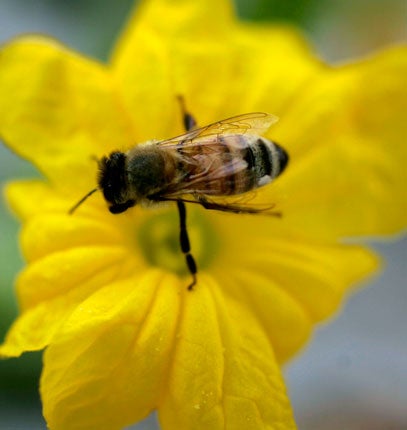Spider venom takes the sting out of pesticides for honeybees
Study finds spiders could be the key to saving honey bees from toxic pesticides

Spiders could be the key to saving bees from harmful toxins after researchers found a bio-pesticide created using spider venom and a plant protein is highly toxic to a number of insect pests – but safe for honeybees.
Approximately 90 per cent of world’s plants rely on pollinators, such as honeybees, to survive.
Common neonicotinoid pesticides are believed to be behind the catastrophic decline in honeybees and this decline could have a serious impact on food production.
A team at Newcastle University tested a combination of a natural toxin from the venom of an Australian funnel web spider and snowdrop lectin called Hv1a/GNA fusion protein bio-pesticide.
The researchers found this new pesticide allows honeybees to forage without harm, even when they received unusually high doses of it. Honeybees perform sophisticated behaviours while foraging that require them to learn and remember floral traits associated with food.
Disruption to this process has catastrophic implications for honeybee colony survival, because bees that cannot learn are unable to find food and return to their hives.
The team discovered that feeding doses of Hv1a/GNA higher than the levels they would ever experience in the field over a period of seven days only had a very slight effect on the bees’ survival. Tests conducted on their memory and behaviour found it did not impact either.
The larvae were also unaffected by the Hv1a/GNA, as they were able to break it down in their gut.
Professor Angharad Gatehouse, based in Newcastle University’s School of Biology and one of the supervisors on the project, explained: “Our findings suggest that Hv1a/GNA is unlikely to cause any detrimental effects on honeybees.
“Previous studies have already shown that it is safe for higher animals, which means it has real potential as a pesticide and offers us a safe alternative to some of those currently on the market.”
Dr Geraldine Wright, the head of the university’s Honeybee Lab, said: “There is now substantial evidence linking neonicotinoid pesticides to poor performance and survival in bees and what we need now is a clear directive from Government to develop and introduce bee-safe alternatives.”
The team’s findings have been published today in the journal Proceedings of the Royal Society B.
Join our commenting forum
Join thought-provoking conversations, follow other Independent readers and see their replies
Comments